Product Features
- 8 award-winning Midas PRO mic preamps and 8 Midas PRO outputs onboard
- 24 motorized 100 mm faders in 3 separate, fully configurable sections
- “Plug and play” remote I/O connectivity for up to 144 input and output signals over 3 AES50 ports featuring Klark Teknik’s SuperMAC technology for ultra-low jitter and latency
- Large main display with capacitive touch screen and adjustable display swivel
- Unique touch-sensitive channel editing section with 11 rotary controls and dedicated color TFT for staying on top of all channel properties
- Optional module for 64 x 64 channels of audio over Ethernet – supporting WAVES SoundGrid Technology * or Dante/AES67 Technology *
- 48 x 48 channel USB 2.0 audio interface onboard with DAW remote control emulating HUI * and Mackie Control *
- Dual-SD card live recorder/player with up to 64 tracks and markers for identifying song positions
- Additional 4-channel control section with rotary controls, buttons and parameter display for permanent access to mains, matrices or “money-channels”
- Premium FX rack with 8 true-stereo processors and world-class TC algorithms, Lexicon *, Quantec * and EMT * emulations
- Standard FX rack with 8 true-stereo processors for a wide array of modulation, EQ, dynamics etc. – also allows blending outboard effects to the mix
- 5 variable plug-in processing slots for all 40 stereo input channels, featuring the most iconic vintage analog equalizers and compressors, plus insert FX slot and 4-band parametric EQ for all 8 stereo aux channels
- Custom Controls offering 16 latching or momentary buttons and 4 rotary controls, easily being configured for preferred functions
- 4 main, 8 matrix and 16 aux stereo buses, featuring dual inserts, 8-band parametric EQ’s, stereo imager and full dynamics processing
- 2 Ethernet ports with integrated switch for networked remote control
- Built-in expansion port for optional audio interface cards or digital networking bridges, MADI * and ADAT/WC
- StageCONNECT 32-channel low-latency interface for personal monitoring or analog I/O boxes, AES/EBU stereo digital in- and outputs on balanced XLR, 8 x 8 balanced TRS auxiliary line in- and outputs, 2 TRS phones connectors, MIDI I/O and 4 GPIO ports
The Personal Mixing Console
The WING control surface utilizes a large capacitive touchscreen interface with touch-sensitive rotary controls for a new ease of operation. Three separate fader sections and a Custom Controls section can be tailored easily and intuitively to meet your personal requirements. No matter if you need a specific bus send fader next to the corresponding channel fader, or a dedicated “money” channel always at your fingertip, or even sharing the surface with two engineers – WING can be configured to elevate your production to a new level. You can even replace and customize the massive wooden armrest with something funkier if you like. The technical drawing can be found in the Downloads section of the product page.

Why Sources?
What is the purpose of mixing in the first place? While considering the signal path of audio production for live or studio applications, we were stunned to find that much of the terminology is still driven by historical technical implementation, rather than its actual purpose. Normally, consoles focus on input numbers assigned to channels and auxes. WING is offering a substantially different perspective by focusing on the Source as the reason for any mixing, say a bass drum signal or the lead vocal. Inputs are therefore given more properties than just a number. Sources can be in mono, stereo or mid-side mode, own headamp parameters like gain and phantom power, with specific source mute and metering. They can also be given a color, icon, name and several tags for grouping and filtering purposes. All of this describes the actual Source first, before channels are used for processing or mixing.
The beauty of this is that you can label Sources using our WING Co-Pilot app while patching on stage and no matter if the signal is patched to a channel, to SD recording or to any other output, you will always see and refer to that Source.
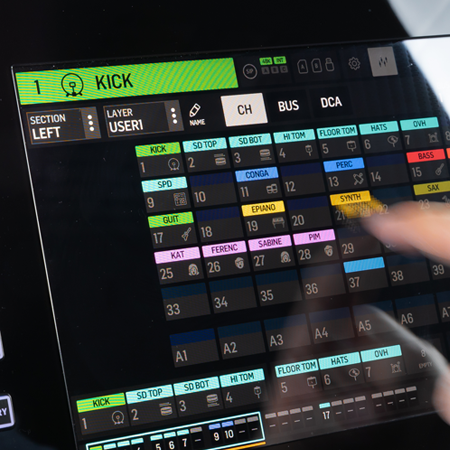
Mono/Stereo
All 48 input channels and 28 bus mixes can be used for mono, stereo or mid-side sources. Assigning a stereo source to any channel automatically renders the channel stereo, and its stereo imager stage provides control over width from 150% stereo down to mono. The console does not need a reboot to apply any mode changes. Their channel, bus and subgroup configuration can be changed any time on the fly. See why it is a WING?
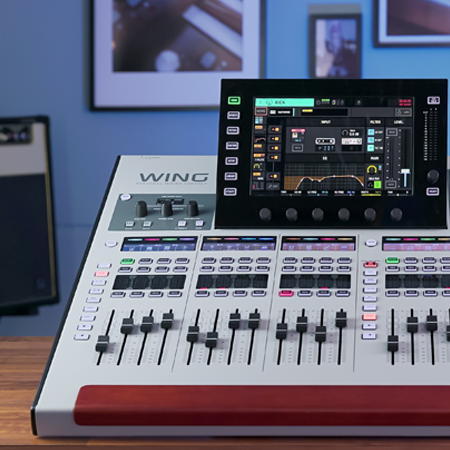
Legacy Built In Every Channel
Alternatively to the excellent WING EQs and dynamics, all channels and buses feature plug-ins for gates, compressors and equalizers, including high-end simulations modeled after the most famous hardware such as Pultec EQ, SSL Bus Compressor and Gate/Expander, SPL Transient Designer, Neve EQ, Compressor and Gate, Focusrite ISA and D3, DBX160, LA-2A, 1176, Elysia mPressor, and Empirical Labs Distressor *
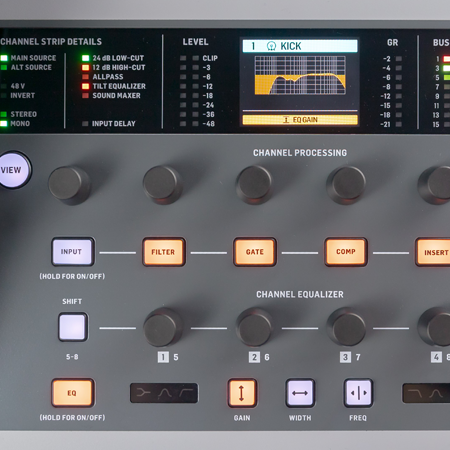
Evident
WING’s innovative channel editing section is designed from the ground-up for immediate channel status overview and flow of operation. It allows working on the selected channel processing even when the main display is used for something completely unrelated. Touch-sensitive rotary controls allow the most relevant information to be displayed at your fingertips.
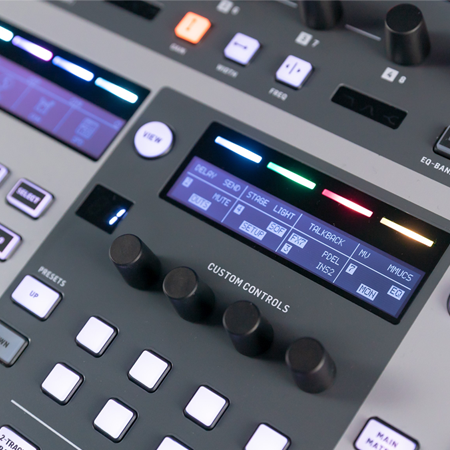
Even More Custom Controls
A central section offers user-assignable controls, i.e. 4 rotary encoders and 20 buttons with 2 LCDs. You decide whatever functions you’d like to have within your reach, always. A big rotary wheel offers fine-adjustments of up to 8 user parameters or can be used for DAW remote control via USB MIDI. The control configuration also includes pre-defined functionality for USB and SD card recorder transport, show control and mute groups.
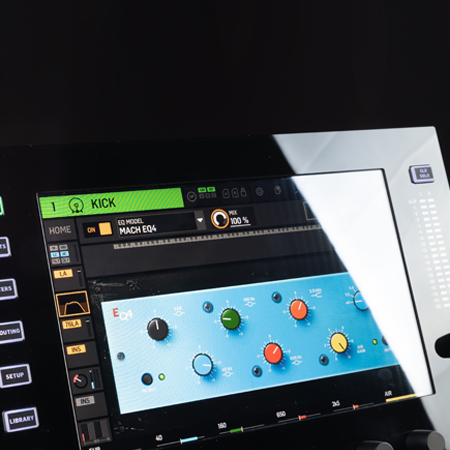
Perfect Balance and Ultimate Tone Shaping
WING Input channels feature lo-cut and hi-cut filters, tilt-EQ, all-pass or Sound Maxer, in addition to the 6-band parametric EQ. All buses, matrices and mains even feature an 8-band parametric EQ. Alternatively, WING offers 8 meticulous emulations of famous hardware equalizers for use in each and every channel, whenever you need that special vibe on your signals.
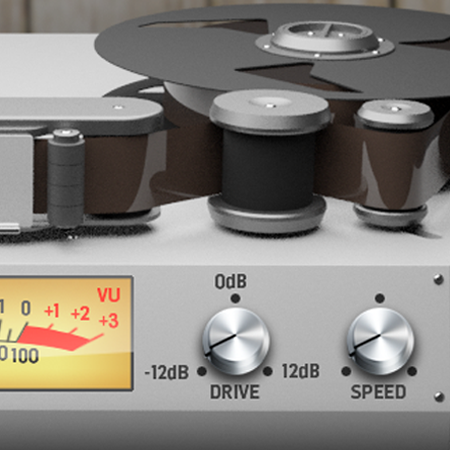
Premium Effects
The WING Premium FX rack boasts 8 true-stereo processors including spectacular emulations of some of the industry’s most revered reverbs, original TC VSS3 algorithms, along with Lexicon, Quantec and EMT emulations. Fantastic delays, voice doubling, chromatic pitch correction, tape saturation and there is way more to it…
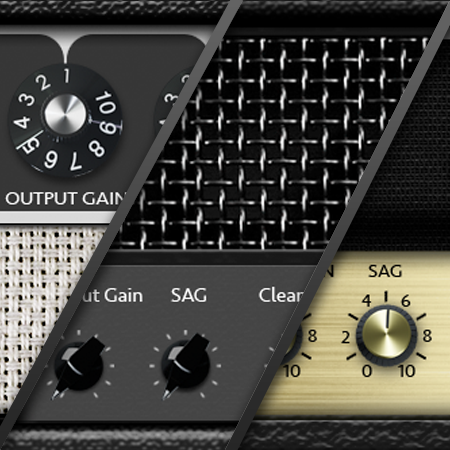
Effects Unleashed
Another set of 8 true-stereo processors provides a wide array of modulation, equalization, dynamics and non-linear effects, and even four iconic guitar amplifiers with cabinet simulations. If push comes to shove, a guitarist can just DI his guitar or pedals straight into the stage box, which is especially useful on quiet stages and house of worship applications.
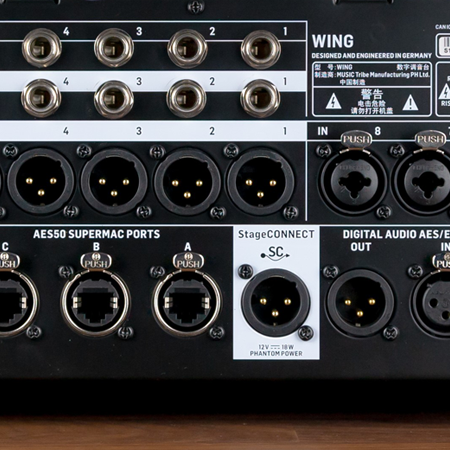
Connected
With 374 inputs and 374 outputs, a lot of digital connectivity is required. WING provides 3 AES50 SuperMAC audio networking ports for connecting digital stageboxes or sharing up to 144 input and 144 output streams with other mixing consoles. There are 48×48 channels of USB audio and another 64×64 channels of Audio over IP (AoIP module optional), plus AES/EBU stereo I/O. The WING expansion card slot, featuring the LIVE SD recording card or accommodating option cards for various standards, such as ADAT, MADI, DANTE, and WSG, offers another 64×64 channels of audio in/out.
The brand new Klark Teknik StageConnect interface allows transmission of 32 channels 24-bit audio with sub-millisecond latency, together with control data and 18 W of power over a single standard XLR cable. Given its flexibility and ease of use, this may well become the future of XLR. For optimum performance and long cable runs 110 Ohm DMX-Cable is required.
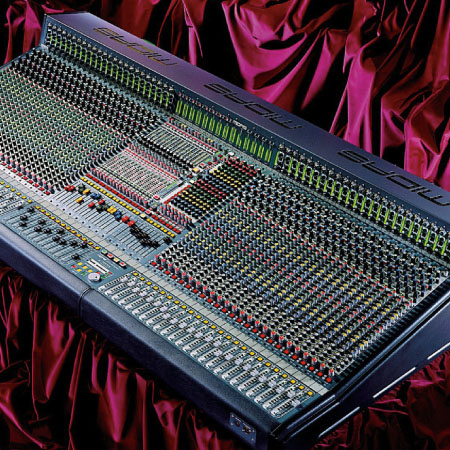
Pristine Springs
While we have limited the number of local analog I/O, we have not allowed for any compromise on their quality. Behringer is proud to incorporate 8 original Midas PRO-Series microphone pre amps and 8 XLR outputs with towering audio quality for both live and studio environments. Find out more about Midas’ amazing legacy by visiting their extensive website. 8×8 TRS line auxiliary ins and outs help bring in signals from media players or computers. If that’s not enough local analog I/O, the new StageConnect interface allows connection of breakout boxes with up to 32 channels of input and output, e.g. connecting the console to the side rack via a single XLR or DMX cable.

Auto Pilot
Automixing with 2 groups of gain sharing is available on any 16 input channels. The dependable and fast algorithm automatically tracks which microphone is receiving the highest levels, increases its channel gain, while reducing the sum of gain for all other channels in the same group. The ambient noise level will remain constantly low, while intelligibility and gain before feedback are increased considerably. It is the ideal tool for corporate events, panel discussions, house of worship or broadcast applications with several speakers.
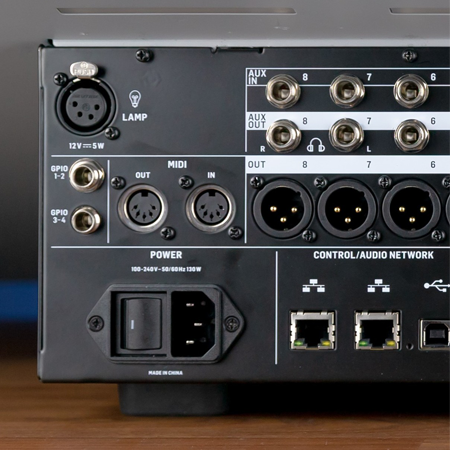
Trigger
MIDI In/Out plus additional 2×2 GPIO provide an interface for console event triggers and external show control.
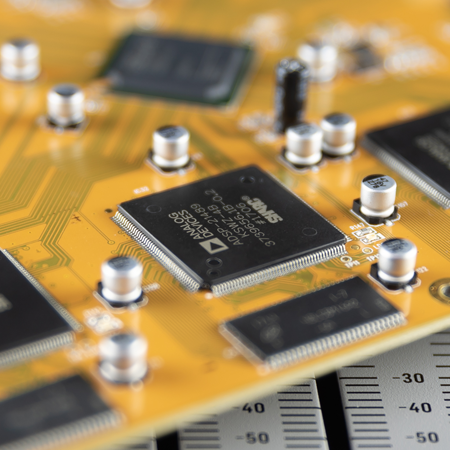
Accurate
40-bit floating point processing at 48 or 44.1 kHz, with 1 ms round-trip latency.
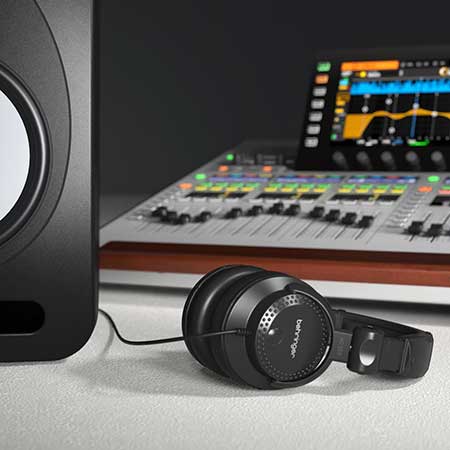
Double Solo
Dual solo/monitor buses per channel for monitoring over phones/IEM and/or floor wedges and studio monitor speakers.
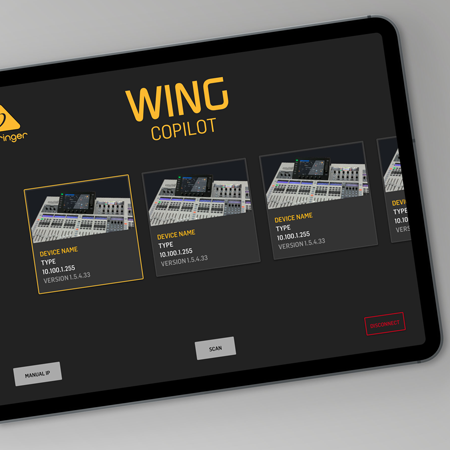
RC and OSC
Networked remote control supports binary and OSC communication and allows console control from a distance. This is open to 3rd party application development in addition to Behringer’s cross-platform app, WING CO-PILOT.
Specification
Input/Output Characteristics
| Frequency response @ 48 kHz sample rate, 0 to -1 dB (any gain setting) | 10 Hz – 20 kHz |
| Dynamic range, analog in to analog out (typical), XLR / aux | 111 dB / 108 dB |
| A/D dynamic range, preamplifier and converter (typical), XLR / aux | 112 dB / 110 dB |
| D/A dynamic range, converter and output (typical), XLR / aux | 118 dB / 112 dB |
| Crosstalk rejection @ 1 kHz, adjacent channels | 100 dB |
| Output level, XLR connectors (nominal / maximum) | +4 dBu / +21 dBu |
| Output impedance, XLR connectors (unbalanced / balanced) | 75 Ω / 75 Ω |
| Input impedance , TRS connectors (unbalanced / balanced) | 20 kΩ / 40 kΩ |
| Non-clip maximum input level, TRS connectors | +16 dBu |
| Aux output level, TRS (nominal / maximum) | +4 dBu / +16 dBu |
| Aux output impedance, TRS (unbalanced / balanced) | 150 Ω / 300 Ω |
| Phones output impedance / maximum output level | 500 mW @ 75 Ω / +18 dBu |
| Residual noise level, XLR out 1-16 connectors, unity gain | -97 dBu |
| Residual noise level, aux and monitor TRS out connectors | -95 dBu |
Displays
| Main screen | 10.1″ TFT LCD, 1280 x 800 px, capacitive touch |
| Main screen swivel, continuous adjustment | 15°- 60° |
| 4-channel group LCD screen with RGB color strip per channel | 320 x 48 monochrome |
| Channel editing screen | 2.4″ TFT LCD, 320 x 240 px |
| Main stereo meter | 18 segment (-60 dB to clip) |
Controls
| 100 mm motor faders | 12 + 8 + 4 |
| Touch-sensitive rotary controls | 3 + 7 + 11 + 4 + 4 |
| Custom controls | |
| Fully assignable rotary controls | 4 |
| Fully assignable backlit buttons | 8 + 8 |
| Variable rotary controls / buttons | 4 / 4 |
Power
| Switch-mode power supply | Auto-ranging 100-240 VAC (50/60 Hz) |
| Power consumption | 130 W |
Physical
| Standard operating temperatur range | 5°C – 40°C (41°F – 104°F) |
| Dimensions (HxWxD) | 201 x 870 x 575 mm (7.9 x 34.3 x 22.6″) |
| Weight | 24 kg (52.8 lbs |






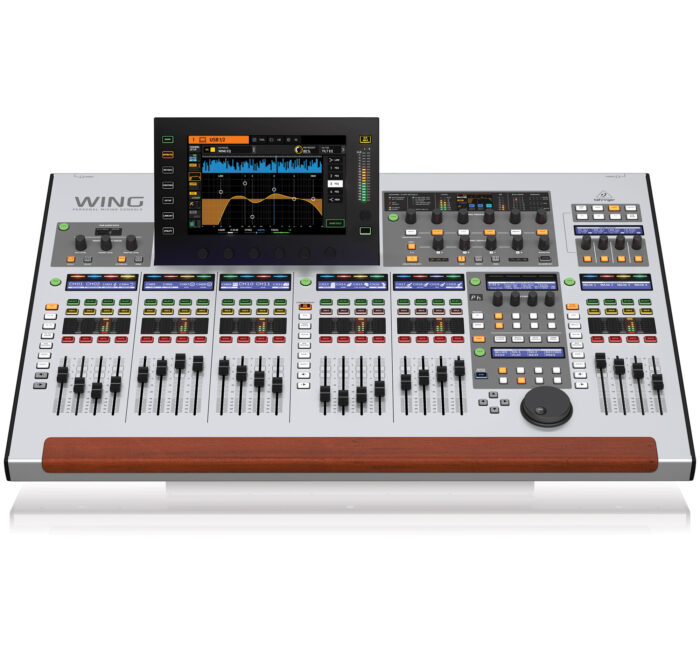
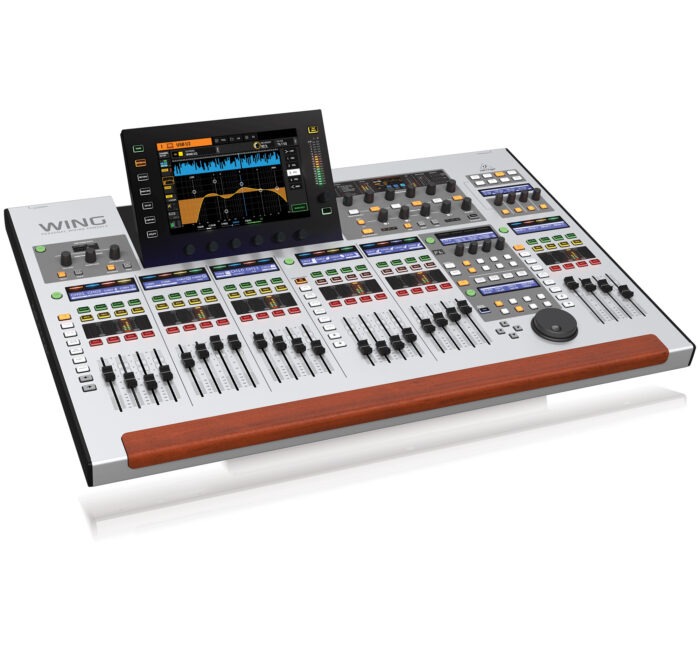
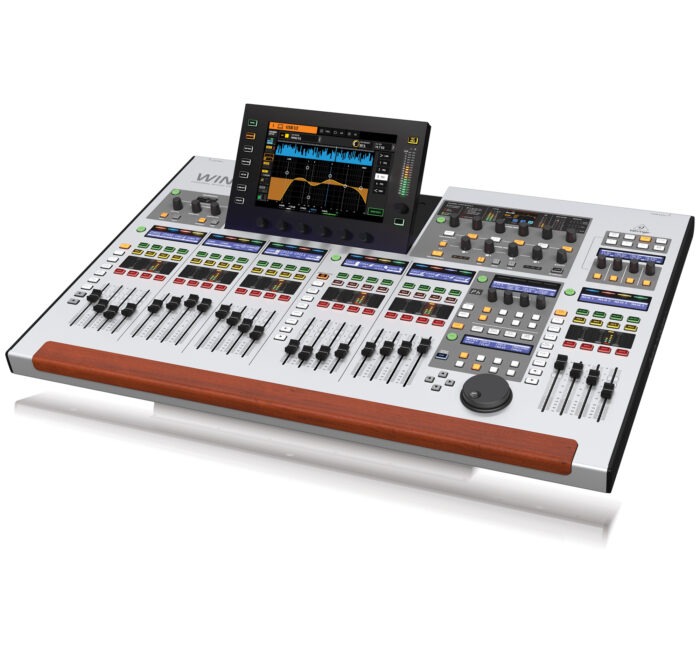
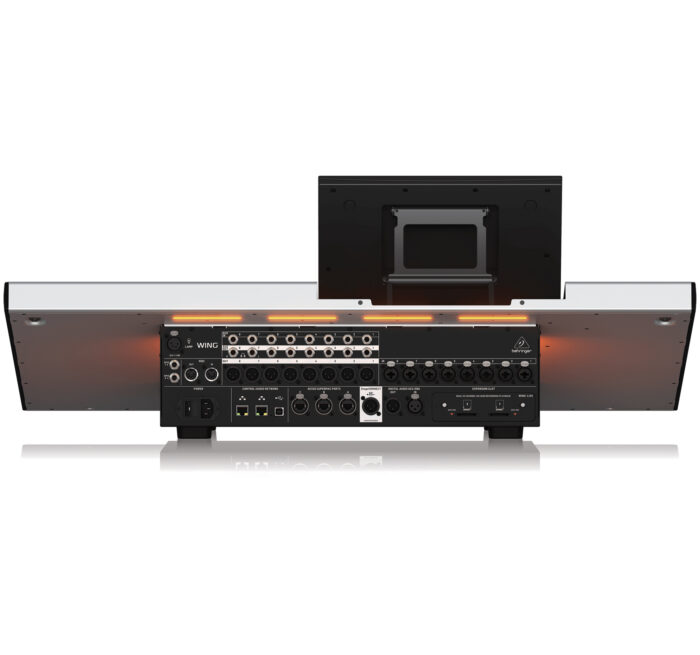
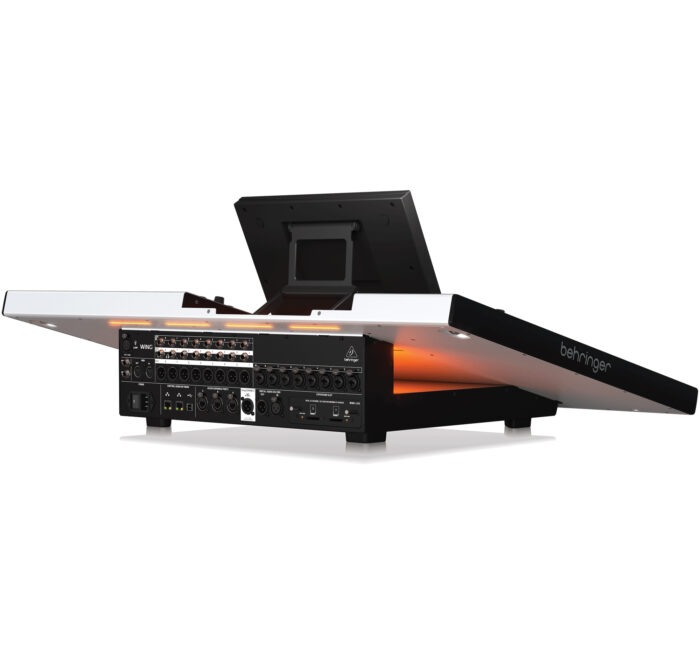
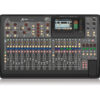
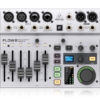
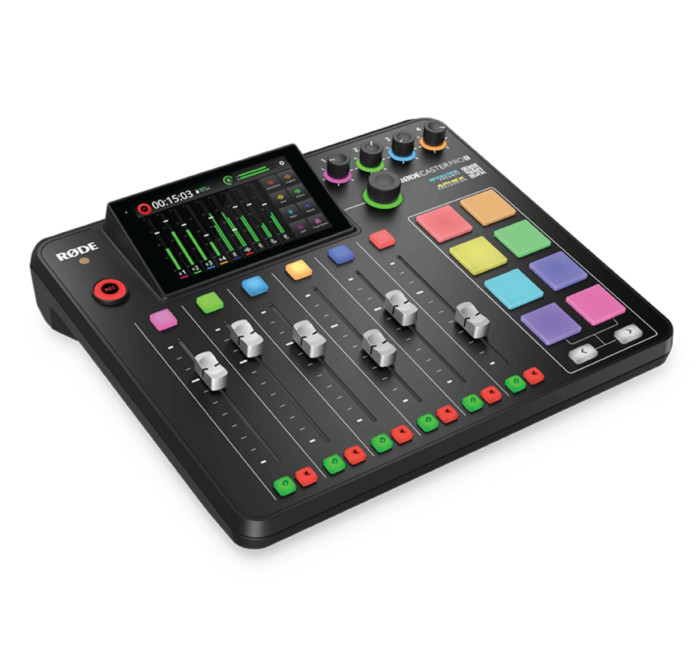
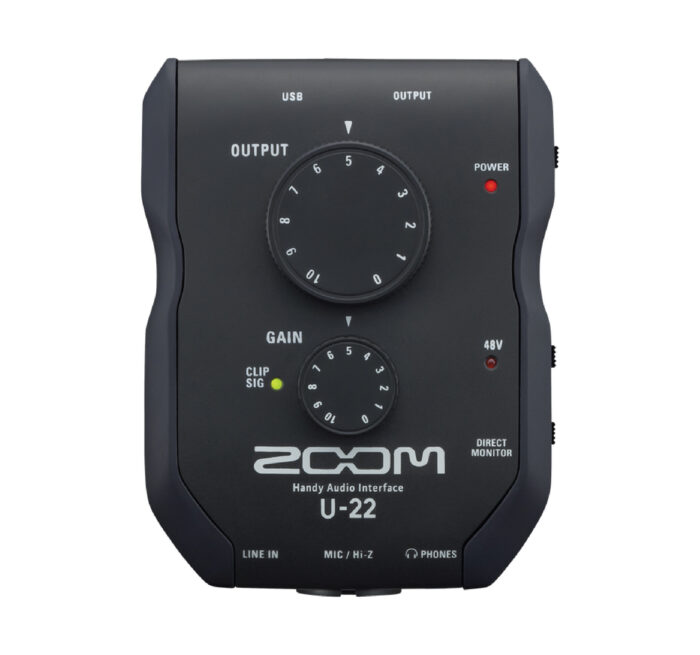
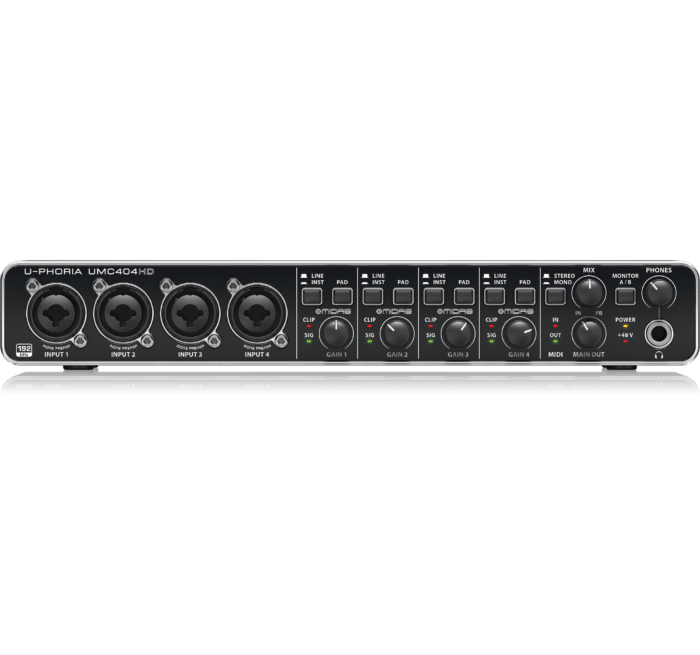
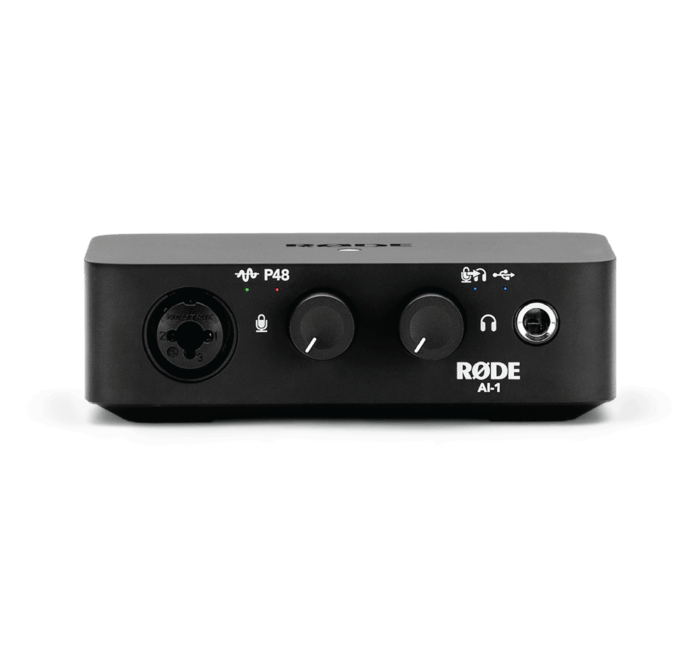
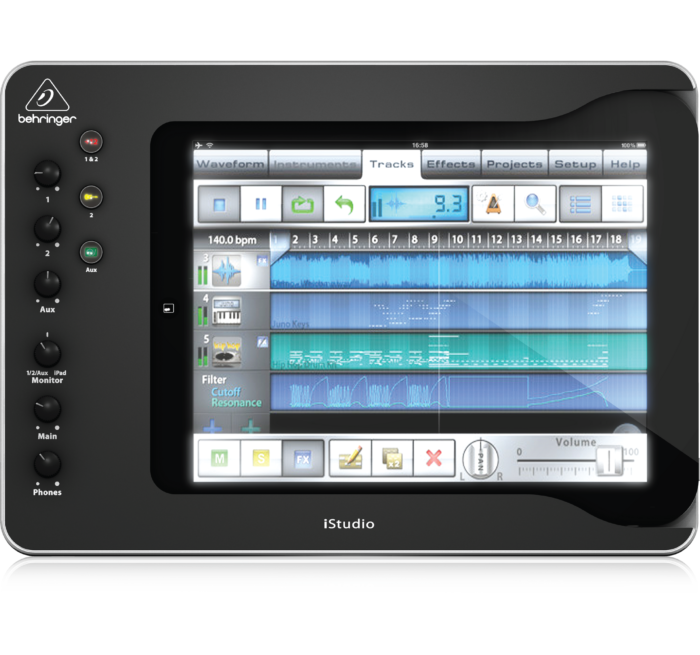
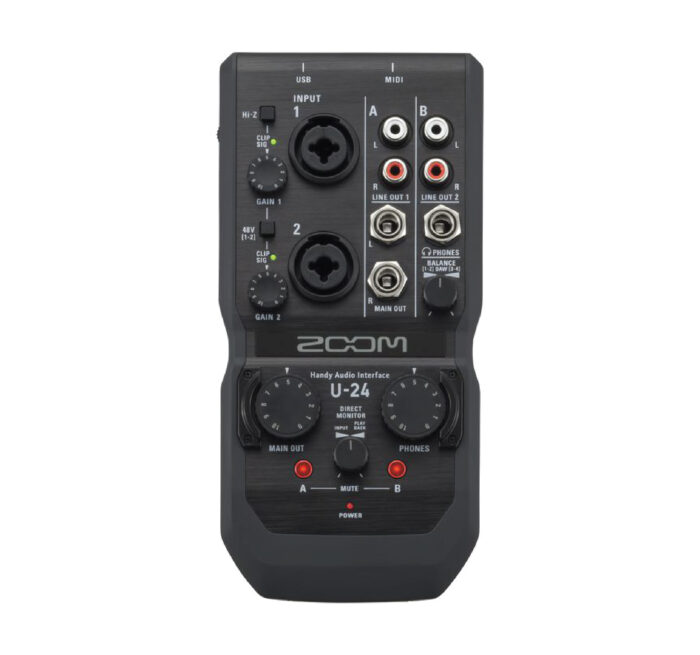
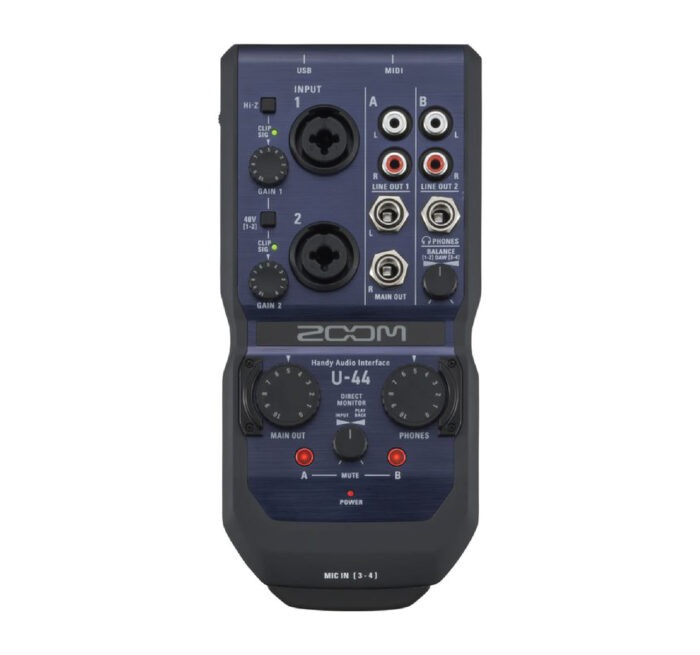
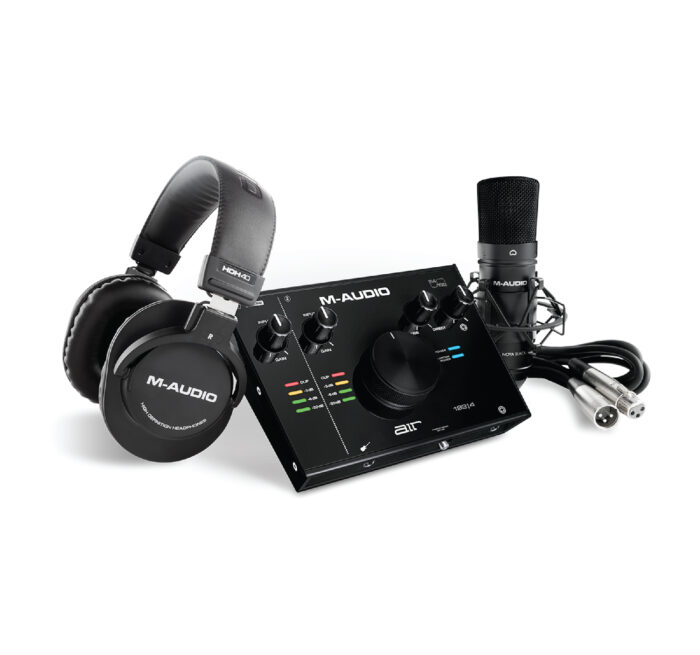

Reviews
There are no reviews yet.